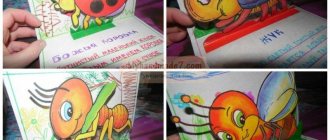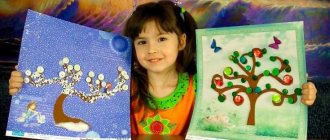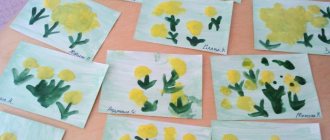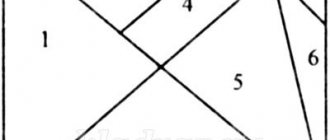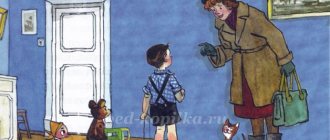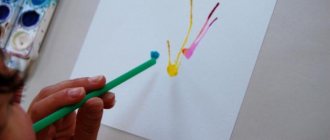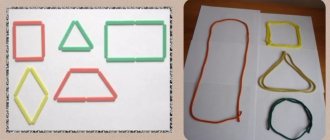Table: card index of topics on labor activity in the senior group of preschool educational institutions
| Author | Savina P.I. | |||
| Type of labor | Subject | Tasks | Examples of work | Note |
| Household labor | "Cleaning up closets and shelves" |
| Try to encourage your children to clear out bookshelves or organize toy cabinets. | Tell the kids a story about slobs and explain that they shouldn’t do that. |
| "Neatly made beds" |
| After quiet time, talk to your children about the importance of keeping their bed tidy. Explain to them in a playful or fairy-tale way about the germs that can appear in the bed if it is not made. | You can cut out figures of microbes from cardboard and place them on the bed of a child who has not made it. | |
| Labor in nature | "Water the plants" |
| Invite the children to take care of the indoor flowers that are in the group. If there are no such flowers, then you can take the children outside and talk about watering plants using the example of street bushes, grass or flower beds. | You can imagine the watering can as a “cloud”. Thanks to this, you will not only show children the principle of working with plants, but also explain what rain is. |
| “Wet wiping of leaves of large-leaved plants” |
| Teach children about the dust that flies in the air and settles on plants. Explain to them how to carefully wipe the leaves. | Try using not only rags, but also damp sponges. They absorb liquid much better and stay wet. They are then easy to dry. | |
| Teamwork | “General work on the corner” | Learn to create collective crafts and figurines to decorate their “children’s corner.” | Use several types of creative materials: paints, pencils, plasticine, cardboard, etc. The main task of the teacher, in addition to instructing and explaining to children how to work, is to control all actions with dangerous tools. | Encourage children to paint with their fingers. You can help color their hands and put them on paper. |
| "Joint and general games" |
| Try playing the group game “Tea-Tea to the Rescue.” The player who will be the “driver” is selected. He runs after other guys and catches them. The child he touches becomes “bewitched.” Another player can touch the “bewitched” and free him. The game ends when all players become "bewitched". | Playing games with sports equipment such as balls or jump ropes is useful not only in terms of developing social skills, but also improves physical abilities. | |
| Self-service | “Independent search for answers to the question posed” |
| Ask your child a question like: “What was the name of the chicken that laid the egg?” Ask your child to find the answer in the story itself. This will prepare him well for future assignments at school. | Question options: “Where is Koshchei’s life hidden?”, “How many knights come out of the sea in Pushkin’s fairy tale?”, “Who is the mermaid?” |
| "Self-care" |
| Provide your child with a clothes brush and talk about how to properly clean clothes. Explain why this should be done (“to look neat”). | Try talking about how to keep your clothes in order so that you have to clean them as little as possible. | |
| Duty | "Duty in the dining room" |
| Select a few children and bring them to the dining room. Then tell them how to set the table and arrange the plates. After this, you can begin practical work and allow the children to do everything on their own. | Try to come up with some little incentives for those guys who were on duty especially well. |
| "Street duty" |
| Give a few kids brooms and offer to sweep the leaves off the paths if it's autumn. In winter, you can ask for help removing small piles of snow using shovels. And in the spring you can show the children how to water the flowers in the flower beds. | Always make sure that your child is assigned only work that he is definitely able to do. | |
| Handmade and artistic work | "Creating Crafts" |
| Try to gather a small group of children and make a plasticine craft with them. For example, the “Hedgehog” craft:
| This type of work allows the teacher to get to know the children better. |
| "Artwork" |
| Give children coloring books and provide pencils. | Try showing your children a few drawings that you can draw yourself. | |
Diagnostics of the results of labor activity in the senior group of preschool educational institutions
The diagnostic card helps the teacher evaluate the results of working with children and sum up the results for the six months. In addition, with the help of this document, the teacher systematizes information and determines what each child has achieved and what he cannot cope with.
The diagnostic card records all types of work activities of senior group students.
Table: example of a diagnostic card
| Author | Savina P.I. | ||
| Development indicators | Actions and tasks | Positive result (the child copes with the task) | Negative result (child fails to complete the task) |
| Motivation | Have a desire to participate in work activities | ||
| Gain the skill of taking a proactive approach to business | |||
| Views of adults' work | Desire to provide all possible assistance to adults | ||
| Attitude to work | Desire to learn about future professions | ||
| Respect for other people's work | |||
| Careful attitude towards the results of your work | |||
| The working process | Careful handling of materials | ||
| Use the most productive work methods | |||
| Finish what you started | |||
| Teamwork | Friendliness and ability to work in a team | ||
| Develop communication skills | |||
| Mandatory | Competently evaluate the results of work | ||
| Have the habit of taking orders responsibly | |||
| Labor in nature | Appreciate and respect nature and its gifts | ||
| Have basic plant care skills | |||
| Know how to plant seeds | |||
| Self-service | Be able to take care of your appearance | ||
| Correct your hairstyle and hair | |||
| Manual labor | Know how to glue cardboard and paper | ||
| Strengthen skills in working with scissors | |||
| Duty | Possess basic table setting skills | ||
| Develop independence | |||
| Household work | Know how to wash things | ||
| Making the bed after sleep | |||
Labor activity is the most important aspect of preschoolers’ education. Children develop the skills necessary for future life in society. The teacher should try to help and guide the child, and instill a love of work. The main thing is not to do all the work for the pupils and allow them to express themselves so that they can fully develop their abilities and potential.
Summary of the organization and management of household work of children in the senior group
Topic: “We wash and repair toys for younger children”
Goal: to teach children to participate in the organized work of a group of peers, to correlate their activities with the work of others and to understand that the work of the subgroup in which you work is part of the common cause of the team.
Management tasks: to create a work culture; to form children’s knowledge about the sequence of the labor process; encourage the desire to take care of younger children, cultivate a desire to work
Preliminary work: conversation about work, memorizing proverbs and sayings about work, reading poems, looking at illustrations and albums about various professions of adults, consolidating ideas about work through didactic games, direct participation of children in work activities.
Materials and equipment: basin, brushes, sponges, soap in a soap dish, tray, three towels, aprons for children, floor cloth
Organization and management of household work: creating a problem situation “Kids have dirty toys”, conversation, intriguing beginning, problematic questions, artistic expression, practical work, relying on children’s knowledge, explanation, demonstration, analysis.
Motivation for work:
V.: - Guys, remember, yesterday Lyudmila Veniaminovna, the teacher of the junior group, turned to us for help? Her children are still too young to wash and repair toys themselves. We're responsive guys, aren't we?
Goal setting:
She asked us to wash the toys for the children in her group, and we will help her and show her little children how to do it correctly. For this I need six willing people. Whoever will do this, come to me. We also need guys to select toys that need to be repaired. 8 guys came up.
— I suggest you divide into subgroups. I need 6 children to wash the toys (the children raised their hands if they wanted).
— I suggest to the other guys to put aside the toys that need repair: Tanya and Alyosha.
V.: - I am proud that we have such helpers in our group!
Work distribution:
Sasha: - We need to distribute responsibilities among ourselves.
V.: - Well done, you guessed that it would be more convenient to complete this task if all the work was distributed among each other: someone would wash the toys, someone would wipe them. Guys, wiping toys takes longer than washing them, and rinsing them even faster. Therefore, you need to assign two children to wash the toys, three to wipe them, and one to rinse them.
- Think about the order in which you will do the work, how should each of you act?
Tanya: - Alyosha and I will sort through the toys and serve them to the children.
V.: - Healthy. (the children quickly explained the next steps)
Children: - Whoever washed the toy, it must be placed on a tray so that the water can drain; another will rinse the toy and put it on another tray, and then those who will wipe them and put them in the basket will take the toys from this tray.
V.: - Now we need to agree on who will do what part of the work. When they work together, it is imperative to distribute the work and decide together who will do what. (the guys independently distributed the “positions” according to their strengths and capabilities). The children get to work, helping each other put on their aprons.
Management of the labor process. The role of the teacher:
I control the sequence of labor actions, recall the rules of joint actions based on a friendly attitude towards peers.
Completion of the labor process and evaluation of the work result:
After finishing the task, I remind the children not to forget to clean up their workspaces.
V.: - Well done guys, the toys are simply sparkling clean, we hope the kids will be pleased with your work. (at this time the teacher of the younger group, Lyudmila Veniaminovna, also came up)
L.V.: — Thank you guys for your coordinated, fast work. Our kids give you treats for your excellent work.
- Goodbye children, I hope that next time you will help us.
Children: - goodbye!
V.: - Remember, guys, what was our original goal?
Ksyusha: - The teacher of the younger group asked us to wash the toys for the kids.
V.: - That's right, you are great fellows. Everyone worked a little, but together they did a great job. Business before pleasure! Who else knows proverbs about work? (children's answers)
V.: - Thank you, you did a good job.
